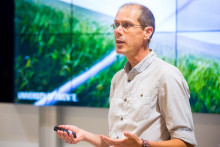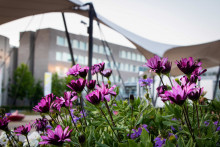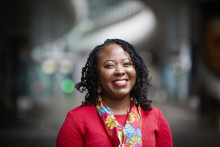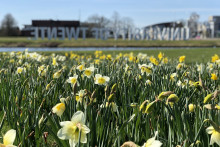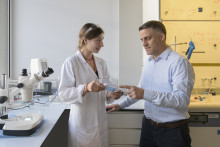Hoekstra explains the thought behind this global network: ‘We consume more and more as our economy is very linear. The more we consume, the more resources we use – land, water, materials – and the more pollutants we put back into the environment. But there are planetary boundaries, limits to how much resources our planet can provide and how much pollutants it can assimilate before turning into a hostile place. The network does not only want to discuss these boundaries but mainly focus on the next question: how to divide the limited resources and emission ceilings among different countries, producers and consumers?’
Planetary quotas
The ‘planetary boundaries’ were already defined by scientists in 2009. They warn about the risks for our planet if it comes to, for example, carbon emissions, water footprint or deforestation. However, they do not give any advice on how we – you, I, governments, companies – can contribute to a sustainable planet. This is what the PAN wants to address. As stated on the network’s website, its goal is to the provide a prescription for a healthy planet through the ‘Planetary Quotas’, global limits for human activities.
‘We want to explore how we can translate the planetary boundaries to your personal behavior,’ says Hoekstra. ‘What can you do? How can you reduce your share in our total environmental footprint? We want to give a scientific basis for this discussion, to open an international debate on how much there is to share and what principles of sharing we could use. It’s one step beyond academics. We want to bridge the gap to the real world, to regular people who are interested in living sustainably.’
Planetary facts on every product label?
Arjen Hoekstra stresses that before defining any specific quotas for people to possibly follow, the first step is raising awareness on all levels, from the UN, to governments, companies and citizens. To achieve that, the PAN will now work on acquiring and disseminating more data. ‘We can’t tell people what to do, but we can show them what the possibilities are and what happens if we do nothing. We do research and generate ideas.’
In the network’s paper published in Sustainable Earth, the scientists presented one idea on how to make people aware of their environmental impact: product labels similar to those that appear on food products. But instead of nutritional facts, such as the amount of calories and sugars, these labels would contain ‘planetary facts’. ‘Yes, theoretically such labels could be created,’ says the UT professor. ‘However, right now this idea is only a tool to stimulate the debate on sustainability. It depends on other people’s enthusiasm whether they become reality.’
Image obtained from paper ‘The Planetary Accounting Framework: a novel, quota-based approach to understanding the impacts of any scale of human activity in the context of Planetary Boundaries’, Meyer and Newman Sustainable Earth (2018) 1:4 https://doi.org/10.1186/s42055-018-0004-3
What can you do now?
What advice can Arjen Hoekstra give to those who would like to help create a healthier planet right now? ‘At a consumer level there are a few things that have a big impact,’ answers the Water Footprint expert. ‘Firstly, waste. We live in a very wasteful society. Buy less, use what you buy and therefore create less waste. Try to move towards a circular economy and buy recycled products. Secondly, consume less animal products. This has a high impact on land use, deforestation, water and carbon footprint, and biodiversity. And lastly, energy. Make sure your life is built on renewable energy, particular solar or wind energy.’


